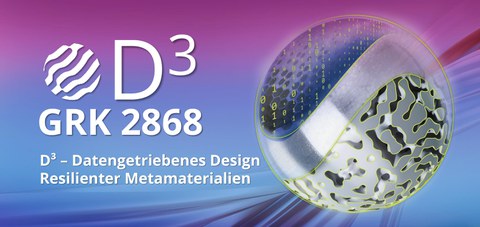May 15, 2023
DFG funds new Research Training Group on metamaterials at TU Dresden
The German Research Foundation (DFG) has approved funding of the Research Training Group (RTG) 2868 "D³ - Data-Driven Design of Resilient Metamaterials" at TU Dresden.
Starting this October, more than 20 young researchers will develop digital methods for the discovery and exploration of new materials. They will be guided by an interdisciplinary team of experts from the fields of mechanics, materials science, mathematics, physics and computer science from TU Dresden, TU Bergakademie Freiberg and TU Chemnitz. The spokesperson of D³ is Markus Kästner, Professor of Computational and Experimental Solid Mechanics at the Faculty of Mechanical Engineering at TU Dresden. DFG is funding D³ with approximately 6.5 million euros for an initial period of five years.
"The digital transformation of engineering and materials science offers huge potential for innovation. In D³, we are qualifying "digital natives", who combine excellent domain knowledge with machine learning and data analysis skills, to drive this transformation process. To attract the best minds we will provide an international, innovative and collaborative research environment," explains spokesperson Prof. Markus Kästner (TU Dresden).
Research will focus on metamaterials, i.e. delicate structures produced by 3D printing that are perceived as a material in a component. The design of the internal structure enables tailored, sometimes extraordinary properties for applications in the mobility, medical and energy sectors. The investigations planned in D³ are aimed at both the mechanical performance and the sustainability of the new materials. "The vision of D³ is to develop and apply a fully digital, data-driven approach to design metamaterials that is transferable to other material systems," Kästner added.
D³ establishes a new internationally oriented, structured program for the qualification of young scientists at TU Dresden that will strengthen the research priority area Materials Science and Engineering, but is also closely related to the research priorities Information Technology and Microelectronics as well as Energy, Mobility and Environment. D³ will intensify the cooperation between different schools of TU Dresden, within DRESDEN-concept as well as between the three Saxon research locations Dresden-Chemnitz-Freiberg.
Contact:
Prof. Markus Kästner
TU Dresden
Chair of Computational and Experimental Solid Mechanics
Tel.: +49 351 463-43065
Author: Jacqueline Duwe

